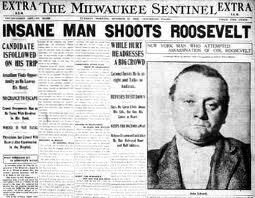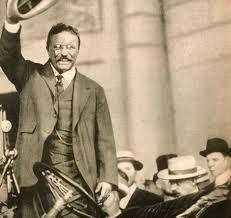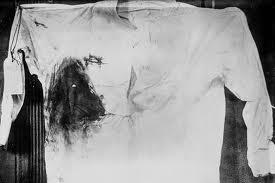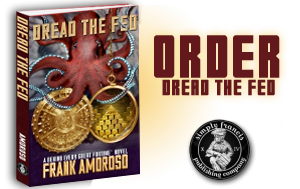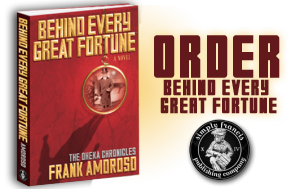Reflections on Political Courage and the 1912 Presidential Campaign ©
The Day Presidential Candidate Theodore Roosevelt Took a Bullet and Continued to Campaign©*
By Frank Amoroso**
October 14, 2012
While the 2012 Presidential Election campaign has been marked by petty parsing of every syllable spoken by the candidates, the centenary of one of the greatest political efforts in American history occurs this month. One hundred years ago, Bull Moose Party candidate Teddy Roosevelt was shot on his way to deliver a speech in Milwaukee where he uttered the fateful words, “It takes more than that to kill a Bull Moose!” Given the fact that the former President had a bullet lodged in his chest when he rasped these words to an audience of over ten thousand, it stands as one of the greatest political speeches of all time and deserves to be remembered.
Former President Runs as Bull Moose Party Candidate
In 1912, Teddy Roosevelt had been out of the White House for four years. He unsuccessfully challenged the incumbent President William Howard Taft for the Republican Party nomination. The popular former President decided to launch a third-party campaign under the Bull Moose Party banner. His ill-fated campaign ended in a Chicago hospital, just weeks before Election Day 1912. This account of the attempted assassination and Roosevelt’s heroic performance is presented in tribute to the courage and fortitude of Teddy Roosevelt.
The young lawyer’s chest swelled with pride as he perused the certificate of admission to the bar in Michigan. At the age of thirty-one, it was the culmination of many years of hard work for the law student in the evening division; but his memories of that day would be dominated by other events that would make his achievement pale in comparison. Elbert E. Martin was a muscular, athletic young man who had played college football and now had the good fortune of serving as one of Theodore Roosevelt’s stenographers on the former President’s whirlwind campaign for a third term as President. Martin had a head of thick brown hair that had grown even more unruly than usual by the relentless campaigning of the Colonel that gave staffers precious little time to attend to personal grooming needs. With a broad, wide face punctuated by dark, close knit eyebrows and a wide straight nose, Bert Martin had a look of rugged determination that attracted Roosevelt when they first met in New York City. When Roosevelt offered Martin the position, Roosevelt advised that he preferred to be called Colonel.
Speech-Making Machine: Roosevelt Indefatigable Candidate
In the barely three months after it had been assembled, the Presidential party had traversed twenty- two states in Pullman railroad cars modified to resemble dormitory rooms. Leaving New York in mid-September, the Bull Moose Express had traveled through the south, making stops in Charleston, Augusta, Birmingham, Chattanooga, Louisville and countless small towns along the way. The campaign then headed into the heartland making stops in Evansville, Indianapolis, and Chicago. Roosevelt’s railway car was dubbed the Mayflower, while the staff and press rode in anonymous adjoining cars that they soon labeled with the names of various barnyard animals.
During this whirlwind campaign, the Colonel had delivered several hundred speeches. When he was not in front of a podium, he was in the Mayflower dictating new speeches. Martin’s fingers were heavily calloused from the incessant workload. Just a few days earlier, Roosevelt had given thirty speeches in one day to different audiences in Michigan attacking candidate Wilson’s anti-labor rhetoric. In considering the rigorous schedule of the fifty-three year old Roosevelt, The Outlook magazine referred to Teddy as an ”electric battery of inexhaustible energy,” making decisions “with a celerity of judgment which takes one’s breath away.”
As might be expected, the arduous schedule took its toll on the Colonel’s voice. The campaign had retained a throat specialist, Dr. Scurry Terrell, to travel as part of the indefatigable Roosevelt’s entourage. On the afternoon of October 14th, the Colonel was suffering from acute laryngitis brought on by his insistence on speaking in a driving rain storm at an outdoor rally on the shores of Lake Michigan. Dr. Terrell had prescribed silence and hot tea laced with honey and lemon. Undeterred, the Colonel was reduced to whispering.
Despite his lack of voice, he was in full warrior mode because of a string of attack articles in Wisconsin newspapers that impugned his character. Rather than resting in Chicago, the Colonel insisted that the campaign proceed to Wisconsin where Roosevelt would put “Little Bob” Lafollette in his place. Lafollette was a constant thorn in Roosevelt’s side. The Wisconsin Senator resented the Colonel’s usurpation of the Progressive cause which Lafollette considered his own. There was also a genuine dislike between the men. Roosevelt in turn resented Lafollette’s incessant sniping through his flunkies in the press. The Colonel was determined to set the record straight when he spoke that evening in Milwaukee to an expected crowd of 15,000 at the Milwaukee Auditorium.
Miniature Bull Moose & the Warrior Mode
The Bull Moose Express chugged into the Northwestern Depot in Milwaukee on that Monday afternoon. The local Progressive Party had arranged for the Colonel to attend a reception at the Gilpatrick Hotel on Kilbourn and North Third Streets before his big speech. The guest of honor was exhausted. After a light dinner, the Colonel plopped into a rocking chair and took a catnap. When it was time to depart for the Auditorium, his campaign manager, Oscar King Davis nudged Roosevelt awake, whispering, “Colonel, it’s time to go.”
Roosevelt’s eyes blinked open and he was on his feet in two seconds. He prided himself on his military man’s uncanny ability to rest wherever possible and return to full alert instantly. The Colonel reviewed his speech for a few minutes and then pronounced himself ready as he folded the thick manuscript and stuffed it into the right inner pocket of his dark, navy suit.
Martin’s duties included functioning as the former President’s valet on even-numbered days. The other stenographer, Joseph W. McGrath performed that role on odd-numbered days. It was a task that neither man resented due to Roosevelt’s convivial nature and the chance to be so close to greatness. As Martin lifted the Colonel’s overcoat, two miniature silver bull moose fell out of one of the pockets and clanked to the floor.
“What in heaven’s name are those?” exclaimed Doug Swanson, the Milwaukee Progressive Party’s portly co-chairman.
“Ah, part of the Colonel’s genius. When we started these whistle stops, criss-crossing the country by train, the crowds were phenomenal. The Colonel has always been a hero figure to young boys and girls. One day, outside of Philly, the children were too close to the locomotive as it was hitching to the Pullman cars. Seeing the danger, the Colonel was appalled and shrieked, ‘Children, don’t crowd so close to the car, it may back up, and we can’t afford to lose any little Bull Moose, you know.’ That incident inspired the Colonel to order thousands of little silver bull moose. He carries these toy moose to give to children on the campaign trail. You should see their eyes when he hands one of these to them. He connects with them famously! And, of course, gains the votes of their parents and the rest of the family. It’s quite a nice touch.”
Swanson smiled at the Colonel’s brilliance as a candidate and asked Martin if he could have one for his daughter. The young aide complied, thinking to himself, ‘It works every time.’
The Colonel approached Martin and performed a crisp about-face holding his arms out. The young lawyer helped the candidate into his overcoat and the Presidential retinue was on its way. Party leader Henry Cochems and bodyguard Alfred Girard led the way down the two flights of stairs from the private dining area to the hotel lobby. They were followed by Roosevelt who was flanked by Elbert Martin and the Texan Cecil Lyon on the Colonel’s left and Fred Leuttisch, another bodyguard and cousin Patrick Roosevelt on the right.
Deranged Murderer Stalks Roosevelt
Waiting in chilly autumn night air outside the hotel, a sizeable group of well-wishers had gathered to get a glimpse of the famous candidate as he headed to the Auditorium. Unbeknownst to the Presidential entourage there was a stalker lurking among the crowd. Earlier in the evening the poorly-dressed man in his mid-thirties had approached Steven Alders, the hotel desk clerk, with a request to see the former President. The tall desk clerk looked down his nose at the short man, noting his shabby clothing and eyes that were bloodshed and “slightly off.”
“I’m sorry, Sir. President Roosevelt is unavailable. Would you like to leave your name and a note?”
“Yes, my name is Albert Ross and I am a guest here. I must see him this evening. I simply must see him.”
“Sir, keep your voice down. I told you already that the President is not available. Now, please step aside,” intoned Alders with a nod to the security man standing by the front entrance. The guard took his cue and sidled over to Ross, saying in a low voice, “Please come with me, Sir.”
As he took his elbow firmly and guided the unhappy man toward the exit, the guest struggled free and stormed off, muttering profanities under his breath. Alders watched through the front window as “Albert Ross” took a position outside with the gathering throng straining to see Roosevelt.
The unwelcome guest’s real name was John Flammang Schrank. He was an unemployed loner from New York City who had been shadowing the campaign since it left New York in September. In 1888, a nine-year-old Schrank emigrated with his parents from Bavaria to the United States. Unfortunately, they died shortly after arriving and the boy was taken in by his uncle who owned a tavern in Manhattan. If John Schrank did not have bad luck he would have had no luck. It was not long before his uncle and aunt passed away. The lonely immigrant inherited the tavern and worked to build a life for himself. While attending St. Mark’s Lutheran Church, in New York’s Little Germany, Kleindeutschland on the Lower East Side, he found a sweetheart and planned to get married when bad luck struck again.
In June, 1904, his fiancé asked him to close the tavern for one day and join her for the annual church picnic on Long Island, not far from Cold Spring Harbor. The outing included a steamboat ride on the General Slocum up the East River to Eaton’s Neck where there would be an idyllic picnic and outdoor recreation. He was unable to find someone to run the tavern on a mid-week day and explained to his beloved Emily that he could not attend. On the morning of June 15, 1904, the ill-fated General Slocum left the pier filled with the mostly women and children congregants of St. Marks. As it passed East 90th Street, the General Slocum caught fire and sank in the East River. More than one thousand people perished in the disaster, including Schrank’s fiancé. The loss of life devastated the community of Little Germany and completely unhinged Schrank. He fell into deep depression and started drinking heavily.
Over the next few years, Schrank deteriorated mentally and emotionally. The loss of life on the General Slocum was so great that it virtually killed the community. Little Germany was a shell of itself; gradually people of German descent moved to happier areas of the City, like the Upper East Side. Schrank sold his real estate and became a drifter. For some reason, known only to Schrank, he became fixated on Teddy Roosevelt when he decided to run for the Presidency in 1912.
Haunted by Slain McKinley’s Ghost
On several occasions that summer Schrank dreamed about President McKinley who had been assassinated more than a decade before and was succeeded by then-Vice President Roosevelt. In the dream, McKinley suddenly sprang up from his coffin and pointed a spectral finger in direction of a robed figure. In his addled mind, Schrank identified the man dressed as a monk to be Roosevelt. The dead president then said, “This is my murderer. Avenge my death!” Schrank committed himself to follow the orders of the Presidential ghost. The former barkeep turned into a stalker and followed the Colonel where ever he campaigned.
Eight years and four months to the day after the tragic death of his fiancé, John Schrank was outside the Gilpatrick Hotel waiting for Roosevelt to emerge. Suddenly, he heard a rising cheer ripple through the crowd as Roosevelt and his party exited the hotel. The cheering was deafening. Roosevelt whisked past Schrank and settled into his roofless automobile. The ovation was boisterous and unrelenting. In acknowledgement of the adoration of the crowd, the Colonel shifted onto the floorboard to raise himself higher. His toothy smile flashed as he waved his hat vigorously in salute.
Roosevelt Shot at Point Blank Range
Schrank seized the moment and pulled a .38-caliber Smith & Wesson long barrel from his begrimed coat. From no more than five feet away he aimed at Roosevelt’s head. Just as the deranged man pulled the trigger an alert spectator named, Adam Bittner, swatted the gunman’s arm. The gun discharged and the Colonel’s knees buckled from the impact of the bullet that lodged in his right chest. Teddy later said that the shot felt like he had been kicked by a horse. He recovered his balance and leaned against the car’s tonneau and again raised his hat, smiling reassuringly.
Before Schrank could pull the trigger again, Martin and Girard, a former Rough Rider, leapt across the car and pounced on Schrank, wrestling the weapon from his hand. Cecil Lyon put a choke hold on Schrank and would have strangled him but for Roosevelt’s intercession.
“Don’t hurt the poor creature,” the Colonel yelled. Roosevelt’s admonition brought sanity back to the blood-thirsty mob that was threatening to lynch the little would-be assassin. Schrank was dragged by Martin, Girard and the police back into the hotel where he was arrested and charged with attempted murder.
The Colonel turned to those gathered and said, “My good friends, I’m not hurt, I’m going on to the hall to speak. Good luck.”
Turning to the chauffeur, the Colonel calmly instructed, “Now, just run the car up to the Auditorium. I’m not hurt and everything’s all right.” The big car pulled away from the scene slowly and arrived at the Auditorium in a matter of minutes. Dr. Terrell examined Teddy backstage and when the physician opened the Colonel’s coat he observed that the garments were saturated in blood. The doctor advised Roosevelt to cancel the speech and go directly to a hospital. Roosevelt asked the doctor to confirm that the absence of blood in his mouth meant that the bullet had not entered his lung. The doctor agreed but still cautioned the candidate to seek medical attention immediately. The Colonel replied courageously,
“I know I am good now; I don’t know how long I may be. This may be my last talk in this cause to our people, and while I am good I am going to the hall and deliver my speech. I’m going to make that speech if it’s the last thing on earth I do.”
Wounded Bull Moose Captivates Milwaukee Auditorium
The house was packed with over ten thousand anxious souls when Henry Cochems took the stage to introduce the former President. Rumors abounded, ranging from Roosevelt was dead, to the assassin misfired, and every possibility in between. The animated buzz died down as a visibly shaken Cochems stepped to the front of the stage.
“Ladies and gentlemen, I have sad news for you. Colonel Roosevelt has been shot. Some crank shot at him as he was on his way here.” The effort almost overwhelmed Cochems who paused to compose himself. The audience inhaled and remained motionless.
He continued, “The colonel is outside here and will soon address you because he insists on it. I ask you to be as quiet as you can, as he is in great pain.”
An impatient Roosevelt walked onto the stage escorted by his bodyguard. Cochems turned toward the former President and reacted as if he were seeing a ghost. Cochems voice trailed off and he slithered off the stage. Roosevelt had a sickly pallor, but he walked confidently and waved energetically at the screaming crowd that responded with relief and joy at seeing Roosevelt pacing up and down gesturing vigorously to the folks in every corner of the arena. He squinted into the lights and began speaking in a soft voice that was barely audible.
“Friends, I shall ask you to be as quiet as possible. I don’t know whether you fully understand that I have just been shot; but it takes more than that to kill a Bull Moose! But fortunately I had my manuscript, so you see I was going to make a long speech, and there is a bullet – there is where the bullet went through – and it probably saved me from it going into my heart. The bullet is in me now, so that I cannot make a very long speech, but I will try my best.”
Ever the showman, the Colonel held up the pages of his speech and showed the bullet holes in the lengthy document. Roosevelt was putting his finger through one of the holes when a doubting Thomas near the front yelled, “Fake!”
“No, it’s no fake,” said a suddenly weary Roosevelt. He paused and took a long draught of water from a glass handed to him by Cecil Lyon. Then, he turned to the silent audience and melodramatically drew his jacket aside and revealed the bright red blood that permeated his white vest and shirt. There was a collective gasp, as the magnitude and reality of bullet wound registered through the crowd.
Theodore Roosevelt spoke for eighty minutes that night with a bullet lodged in his right chest. It was one of the most memorable and courageous speeches ever given on American soil. When it was over the Colonel was rushed to Johnson Emergency Hospital where he was given a tetanus shot.. Near the entrance to the emergency room, Dr. Sayle, the chief surgeon was holding court with the throng of reporters who had crowded into the wide bay door that led to the emergency room.
Questionable Emergency Treatment & Evacuation to Mercy Hospital in Chicago
Dr. Sayle was in his late fifties, slightly overweight with a round, cheery face. He had been the chief surgeon at the Johnson Emergency Hospital for more than a decade. After an undistinguished career, he had been promoted by the Board of Directors that was dominated by its largest benefactor, William J. Hawthorne who just happened to be Sayle’s father-in-law. Dr. Sayle had never experienced the media attention resulting from an assassination attempt on a high profile patient and was preening like a peacock before the national press corps that traveled with the Roosevelt campaign.
“Gentlemen, I am Dr. Sayle, S-A-Y-L-E, the chief emergency surgeon here at Johnson Emergency Hospital. I have a brief statement on the condition of the former President who as you know was shot this evening at the Auditorium. Colonel Roosevelt has a superficial flesh wound in the right breast, with no evidence of injury to the lung. The bleeding was insignificant, and the wound was immediately cleansed externally and dressed with sterile gauze. The former President just needs rest. Now, I will entertain your questions.”
While Dr. Sayle held court, Jerry Stratton, a local committeeman entered the hallway to the emergency room with his brother, Dr. T.A. Stratton who happened to be at the rally. Jerry signaled to O.K. Davis, Roosevelt’s senior campaign advisor, a gristled old newspaperman who was a dear friend of Roosevelt.
“Oscar, this is my brother Thomas. He is the top trauma surgeon in the country. He’s the head of Trauma Medicine at Johns Hopkins Medical Center. I’d like my brother to examine the Colonel. I don’t trust that clown Sayle. His father-in-law has gotten him out of more malpractice suits than Carter has liver pills. Please just let my brother take a look at the Colonel.”
“Doc, I know your reputation as one of the best trauma surgeons in the world. This is no ordinary patient. He really is as tough as nails. But I’m afraid that the doctors here are more interested in ingratiating themselves to the press than their patient. I just heard Dr. Sayle tell the press that the bleeding was insignificant. Doc, I’m no medical man, but I saw more blood come out of the Colonel tonight than I used to see on my uncle’s farm when he’d slaughter a pig for an Independence Day barbeque. I would never call that amount of blood insignificant. I’m worried. I’m sure the Roosevelt family would be most appreciative if you were to examine Teddy.” Dr. Stratton was a tall, patrician-looking man with a gaunt face that exhibited furrowed brows and cool, penetrating eyes. His hands were pale and limber from the rigors of his specialty. He nodded affirmatively to Davis, removed his overcoat and strode into the emergency room like Moses parting the Red Sea. Behind them, Sayle droned on to the media who had begun to drift away, their notebooks filled with enough information they could use in their stories.
Davis and Jerry Stratton stood outside the ER exchanging pleasantries about the campaign and the country’s need for a battle-tested President. Then, as majestically as he strode into the ER, Dr. Stratton emerged. His face betrayed no emotion, save a look of grave concern in his eyes. He walked over to the campaign manager and said in a low voice,
“Get him out of here as quickly as you can. This is no place for him! Take him to Mercy Hospital in Chicago. I will call Brandon Quercio and put him on alert. He is a former student of mine. He’s an outstanding trauma physician. I’m scheduled to return to Washington in the morning for an urgent meeting with the medical brass at the War Department; otherwise, I’d go with you.”
O.K. Davis sprang into action. He walked over to Dr. Sayle and asked to speak to him privately. Reluctantly, Dr. Sayle moved away from the press and listened intently, nodding as Davis communicated the change of plans. It was hard to tell whether Sayle was more relieved or disappointed by the news. He turned to the press and without missing a beat, advised that,
“As the bullet passed through Colonel Roosevelt’s overcoat, other clothes, doubled manuscript and metal spectacle case, its force was diminished. The appearance gives evidence of a much spent bullet. His condition is so good that the surgeons do not object to his continuing his journey in his private car to Chicago, where he will be placed under surgical care.”
Roosevelt Sidelined for Remainder of Campaign & Finishes Second
Later that night, the former President was removed to Mercy Hospital in Chicago where he stayed for the next eight days. The Colonel suffered a broken rib and the bullet was so deeply lodged in his chest that it was inoperable. Teddy carried the lead reminder from Schrank’s revolver in his chest for the rest of his life.
The resultant damage to Roosevelt’s Presidential campaign was inestimable. He was unable to deliver a series of sledgehammer speeches he had prepared to present his vision to the voters. Only untethered speculation could say whether the Colonel would have been able to prevail had his campaign not been derailed. The analysts could only say that on a cold night in Milwaukee a lone, deranged assassin altered the course of history. Those in attendance would never forget one of the most remarkable speeches ever given by an American political figure. Nor should we.
*This article was written during the 2012 presidential campaign and presents an interesting historical contrast with modern politics.
**Frank Amoroso is the author of Behind Every Great Fortune™ an historical novel set in the turbulent second decade of the 20th century. Behind Every Great Fortune™ chronicles the life and times of Otto Kahn, the international financier whose fortune was so great that he was immortalized as the iconic monopoly guy. Otto Kahn helped finance Theodore Roosevelt’s 1912 presidential campaign. Kahn later built Oheka Castle, his monument to money and power, near Theodore Roosevelt’s Long Island estate at Sagamore Hill. To learn more follow The Monocle on Twitter @Ottosmonocle or visit www.behindeverygreatfortune.com

